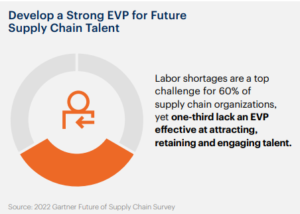by Anna McGovern
Our industry is in a strange place, one in which most of the seasoned procurement and planning professionals are nearing retirement or are already retired. Worse than the loss of warm bodies is the loss of institutional knowledge that walked out the door with them. This reality, accompanied by record-low unemployment, has many companies struggling to attract and retain top procurement professionals.
Filling the Procurement Professionals Skills Gap
Procurement professionals are the experts who specialize in the management of sourcing, negotiation, and purchasing processes. They play a huge role in helping companies streamline their supply chains, source materials and resources effectively, and achieve significant cost savings. So, when a company struggles to find professionals with the requisite experience and skills, their entire bottom line can suffer.
According to Deloitte’s 2023 CPO Survey , “Nearly 90 percent of procurement leaders surveyed agreed that talent is the single greatest factor driving procurement performance, yet around 50 percent said they don’t believe they have the talent they need.”
The Challenge of Procurement Talent Acquisition and Retention
Retirement poses a significant threat to a company’s procurement capabilities, as experienced individuals often take valuable institutional knowledge with them. The loss of such knowledge can hinder the efficiency of procurement processes, potentially leading to missed opportunities, increased risks, and compromised supplier relationships. Additionally, the procurement landscape is evolving rapidly with new tech innovations, global market changes, and complex regulatory requirements. As a result, companies face challenges in keeping their procurement teams updated and equipped with the latest knowledge and skills.
As noted on ProcureCon Asia, “[A] disconnect has emerged between the skills procurement needs from its employees, and the skills the existing workforce can actually demonstrate. Procurement leaders around the globe are growing increasingly concerned that the demand for adequately skilled procurement professionals is outstripping supply.”
How to Prevent a Crisis of Talent in Procurement
“Ninety-five percent of supply chains must quickly react to changing conditions, but only 7% are able to execute decisions in real time.” – 2022 Gartner Future of Supply Chain Survey. But according to the survey, CSCOs say retaining talent is the top challenge to human-centric work design over the next 3-5 years.

More than half (54%) of all supply chain organizations report that an inability to access talent has interrupted or curtailed business activities in their organizations during the past 12 months.
Gartner says, “With the right digital technology, data and talent, the supply chain of the future will be adept at executing real-time decisions, at the speed that makes sense for each process. Future supply chains will be able to connect decisions to automated execution across the end-to-end supply chain.”
Sara Horder, senior partner of Investigo, part of The IN Group, was interviewed by Procurement Magazine for her views regarding talent management’s importance to procurement. She begins by explaining: “The moment you undervalue a role, is when the attraction doesn’t really stay alive.”
Horder believes that companies need to develop a “culture of continuous learning” in order to “develop high-potential employees while also building a strong pipeline.” At the same time, she urges companies to cover “all bases in terms of passive, internal and external candidates.” She identifies other factors that can lead to better hiring and retention of procurement professionals, including:
- DE&I
- Training procurement teams
- Working with recruitment professionals
Joseph Walden, associate teaching professor at the University of Kansas School of Business, identifies another issue with the skills gap and shortage of procurement professionals. He explains:
Like other areas of supply chain management, there is a talent gap in the procurement career field. Some of this gap may be the result of internal training within companies; however, part of it can be traced to what future supply chain managers and procurement professionals are learning or not learning while studying at colleges and universities.
You can read more of his research in the Journal of Supply Chain Management.
Outsourcing as a Strategic Solution to Procurement Pain
To address the challenges associated with talent acquisition and retention in procurement, many organizations are finding it beneficial to outsource their procurement and planning needs to industry professionals. Outsourcing allows companies to tap into the expertise of experienced professionals who specialize in procurement and have a broader understanding of market trends and industry best practices.
How is your organization investing in procurement? How are you training your teams? Share your thoughts with me. 👇
If you want to discuss supply chain planning and procurement excellence, let’s chat. I want to know your thoughts. Book a Discovery Call Now


4 thoughts on “Where Have All the Procurement Professionals Gone?”